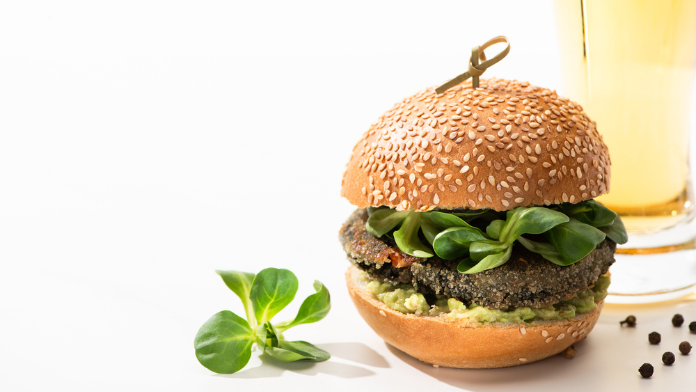They are young, but already quite successful. Are the prodotti plant based, the food trend of the moment. Which, however, hopes not to remain a trend because the goal of plant-based products is ambitious: to reduce the consumption of foods of animal origin and make diets more sustainable. According to a survey conducted by AstraRicerche and Unione Italiana Food, which compared the habits of 1,200 people, some consumers and some not, of plant-based products, more than one Italian out of two buys them regularly. Vegetable-based burgers and ready-to-eat dishes are particularly popular, but the cart also includes ice cream and desserts as well as the very popular vegetable drinks (half of the sample consumes them regularly).
In this article
What are plant based products
Plant based products are burgers, drinks, ice creams, sweets, spoon products with lactic ferments, sauces, condiments and spreadable creams composed of vegetable ingredients, such as legumes, vegetables and cereals. They imitate the original product, more in shape than in flavour, because in fact a burger made up of peas and aubergines has nothing to do with a meat burger, however there are more and more companies that imitate red meat even in flavour. Plant-based eating it doesn’t mean being vegan or vegetarian. The choice also extends to people who want, mostly for reasons of sustainability but also for well being personnel, reduce the consumption of animal products, such as meat, fish and eggs, the production of which weighs heavily on the environment. This type of consumer – defined flexitarians – eat plant-based, but most do not completely preclude the (occasional) consumption of animal products.
Plant based products: positive for the environment
Why are they chosen? From the survey, it emerges that those who buy them do so because they are good and tasty (71,3%), digestible (71.1%), because they help to achieve a proper nutrition (71%), because they are good for the planet (70.3%), and also because they are formulated with ingredients of natural origin (70.3%) and high quality (70%). They push the consumption of these products the need for to vary daily nutrition (41.8%, a percentage that rises among the over 55s) and the desire to reduce the consumption of animal proteins (32.2%). Also on sustainability of the plant-based almost eight out of ten connoisseurs (77.5%) agree. However they remain doubts among a 15.6%, who think that these products are made by consuming a lot of water and producing large quantities of carbon dioxide.
«Numerous studies have shown that plant products have a reduced environmental impact», explains Ludovica Principato, adjunct professor in Sustainable business management at Roma Tre University. “The food we consume has a direct impact on the planet and the use of its natural resources. In Italy, the widespread adoption of a flexitarian diet, richer in foods of plant origin (such as vegetables, fruit, whole grains, legumes), would have very positive effects. For example in terms of lower greenhouse gas emissions and greater water savings, compared to the current diet followed in our country. They would produce saw gas equivalent to 106 Mt CO2eq, instead of 187. They would also be used cultivated land equal to 15,000 football fields, instead of 20,000. Finally, the water consumed would be equal to 17 km³, instead of 26. With a water saving equivalent to 3 million and 600 thousand Olympic swimming pools”.
The difference between plant based meat and synthetic meat
The carne plant based it has nothing to do with that synthetic. However, one in ten people who know vegetable burgers and synthetic meat still thinks that these products could be the same thing. A meager 6% of plant-based products are even made in laboratories. «Plant-based and synthetic meat (or, better, cultured meat) are two products totally different. Both in terms of characteristics and composition», he specifies Lucilla Looknutritionist biologist and researcher at the European Institute of Oncology (IEO) in Milan.
«Plant-based products are born from vegetable raw materials that have always been part of our diet. Like vegetables, grains and legumes. There novelty of these products lies in the way these ingredients are used for create something that didn’t exist before. And which consumers have shown to appreciate». Cultured meat, on the other hand, is made from animal stem cells that are grown in the laboratory and replicated to produce the piece of meat. «Plant-based products should be considered as allies. Indeed, they can help us integrate portions of cereals, legumes, fruit and vegetables and to keep one balanced diet». In general, plant-based products have a low fat content, in particular saturated fat, many fibers and many proteins, especially if they are based on legumes and in particular soy.
Type of plant based products
- Veggie burgers and meatballs – are produced with various ingredients including, to name a few, soy protein, seitan, rice, peas, other cereals and vegetables.
- Vegetable drinks – the most common are those based on soy, rice, almonds, coconut and oats. There are also, albeit less widespread, drinks based on hazelnuts, walnuts, cashews, millet, barley, spelled, peas or lupins.
- Vegetable ice cream – derives from the seed of a leguminous plant (for example beans, broad beans, peas) and is prepared without milk. For this reason it is also perfect for lactose intolerant people.
- Vegetable spreadable creams – are mostly obtained from vegetable drinks based on soy, almond or rice. They have a consistency and flavor similar to those of traditional cheeses.
(Source Unione Italiana Food)

